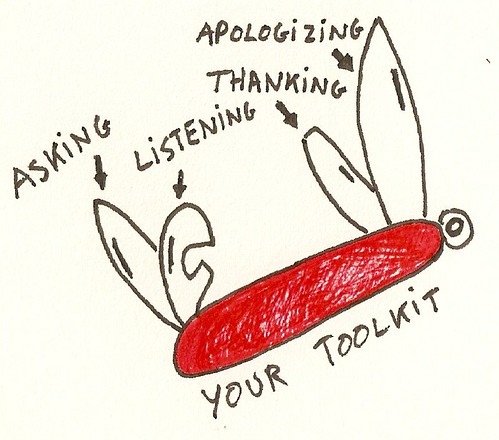Some things in life are too simple to be true. Take for example the most effective tools that allows people to be responsible for relationships. Hint: they are available to all human beings.
Earlier this month I stated that the quality of a communication is determined by the extent to which the receiver feels understood and involved, rather than by the amount or even the quality of information. In other words: it is the relationship, rather than the content which determines the quality of a communication.
One week later I continued by saying that the sender of a message has the most possibilities at hand by declaring oneself the context for all the circumstances that occur with regards to the communication (“being the board” as Ben Zander calls it) .
Destination: Relationship
Last week my friend Alex was kind enough to open my eyes to the fact that ‘being the board’ is about being the cause for something to occur, instead of being the outcome of a situation. He said:
If you feel like you’re the victim of a situation, that is because you see yourself as the effect of a situation instead of the cause. But the one thing you should know is that you can control your own reactions and initiatives; and these should be driven by a smarter objective. So have another look at what you would like to create, because you DO create the situation you are in by means of your reactions and initiatives.
So there I was, looking at my own knowing-doing gap; and Alex gave me the “X” on the map that told me “you are here“: I’ve been writing about this stuff for quite some time, running workshops on that topic and yet I was stuck like a fish on a hook.
Until Alex told me I can choose to be the pond instead of the fish in terms of how I act and react in a situation. Do I want to be a fish? Then I will get hooked every time the bait is thrown out. Do I choose to be the pond? Then I will be the context where both the fish and hook are welcome!
In terms of communication it comes down to this: if I want to be right, it’s the best guarantee for a conflict. On the other hand, when my destination is relationship there are a lot of ways to make others win and at the same time being the cause for this situation to occur. All it takes is a healthy dose of integrity.
Toolkit: Integrity
So the next question is: exactly “HOW” can I be the cause for relationship to occur? There are 4 ways to do so and they are universal, i.e.: they are available to anyone, anytime, anywhere. They are:

1. Asking for help: The great Peter Drucker once said:
The leader of the future will be a person who knows how to ask.
Asking for help opens doors with honesty and is difficult to resist. It allows your counterpart to have a stake in the solution and to ‘win’ and at the same time you are the cause for this situation to occur.
2. Listening: Attention here – listening is a two-way act, as it involves listening AND acknowledging what you have understood. You need to demonstrate that you are totally engaged. Aknowledging is the part that makes people feel understood and connected.
3. Thanking: Gratitude is a skill we can never display too often. And yet for most people it seems like they need to wait for the perfect moment … but it never comes. It is always the right time to say ‘thank you’. Gratitude is not a limited resource and an overdose is not harmful.
4. Apologizing: Marshall Goldsmith calls this ‘the magic move‘, because an apology is a recognition that mistakes have been made and it contains an intention to change for the better. But most of all, an apology is an emotional contact with the people you care about. It is a closure which lets you move forward.
Bad News for Ego
You will note that these four ways have one thing in common: they require you to be humble and to position yourself ‘one down’ with regards to the person you are talking to. You can only access these tools when you let go of your need to win the competition for being right.
In his 2007 bestseller What Got You Here Won’t Get You There, Marshall Goldsmith says:
When you declare your dependence on others, they usually agree to help.
So your only way out is by putting aside ego. It is only when you decide to give up on being right that you will be able to ask for help, to acknowledge feedback, to express gratitude, or to make an apology.




